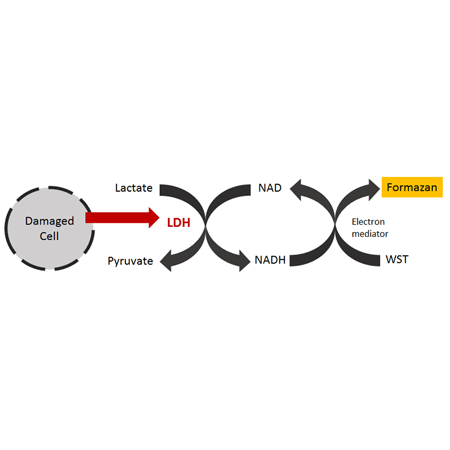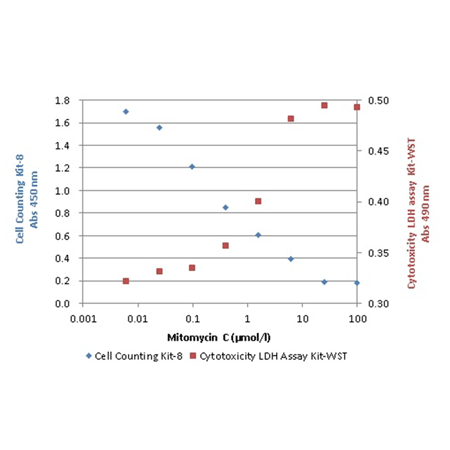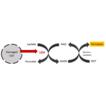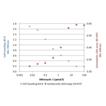-
Homogenous assay using living cells or non-homogenous assay protocol using cell culture supernatant
-
Stable working solution
The LDH cytotoxicity WST assay is a colorimetric assay kit used to determine cytotoxicity by measuring lactate dehydrogenase activity released from damaged cells.

Mechanism for LDH Cytotoxicity WST Assay

Difference between the Cell Counting Kit-8 (Prod. No. ALX-850-039) and the LDH Cytotoxicity WST Assay. The Cell Counting Kit-8 determines the number of viable cells in cell proliferation and cytotoxicity assays. On the other hand, the LDH Cytotoxicity WST Assay evaluates the cytotoxic level by measuring the amount of LDH released from damaged cells. Assessing the level of cytotoxicity by combining both the Cell Counting Kit-8 Kit and the LDH Cytotoxicity WST Assay can provide researchers with a complete evaluation of cell health.
Please mouse over
Product Details
| Applications: | Colorimetric detection
|
| |
| Quantity: | 500 tests/5ml
2500 tests/5 x 5ml |
| |
| Handling: | Protect from light. Avoid freeze/thaw cycles. |
| |
| Shipping: | Blue Ice Not Frozen |
| |
| Long Term Storage: | +4°C |
| |
| Scientific Background: | LDH is a stable cytoplasmic enzyme presented in all types of cells and released into the cell culture medium through damaged plasma membrane. |
| |
| Technical Info/Product Notes: | Principle: LDH catalyzes dehydrogenation of lactate to pyruvate, reducing NAD to NADH. NADH reduces a water soluble tetrazolium salt (WST) in the presence of an electron mediator to produce an orange formazan dye. The amount of formazan dye produced is proportional to the amount of LDH released into the medium, indicating cytotoxicity. |
| |
| Regulatory Status: | RUO - Research Use Only |
| |
| Compatibility: | This product is compatible with the Absorbance 96 Plate Reader.
 |
| |
Product Literature References
Bisdemethoxycurcumin-mediated Attenuation of Apoptosis Prevents Gentamicin-induced Ototoxicity in Mouse Cochlear UB/OC-2 Cells: T.Y. Kang, et al.; In Vivo
36, 1095 (2022),
Abstract;
The Nrf1 transcription factor is induced by patulin and protects against patulin cytotoxicity: J.J.W. Han, et al.; Toxicology
471, 153173 (2022),
Abstract;
The role of plasminogen activator inhibitor-2 in pneumococcal meningitis: N.C. Teske, et al.; Acta Neuropathol. Commun.
10, 155 (2022),
Abstract;
Interruption of Helicobacter pylori-Induced NLRP3 Inflammasome Activation by Chalcone Derivatives: H.R. Choi, et al.; Biomol. Ther. (Seoul)
29, 410 (2021),
Application(s): Cytotoxicity after H. pylori infection of THP-1 cells,
Abstract;
Ethanol extract of Allium fistulosum inhibits development of non-alcoholic fatty liver disease: J.T. Hwang, et al.; Nutr. Res. Pract.
12, 110 (2018),
Abstract;
Full Text
Related Products















